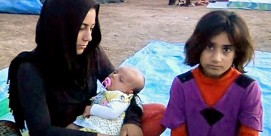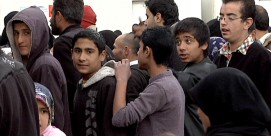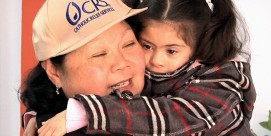In This Episode << SLIDE LEFT TO SEE ADDITIONAL SEGMENTS
Humanitarian Challenges in Chile and Haiti
KIM LAWTON, anchor: It was a demanding week for global humanitarian groups as they raced to get emergency help to Chile even as they continued relief efforts in Haiti. More than 800 people were killed and two million left homeless by last weekend’s earthquake and tsunami along Chile’s coast. Faith-based groups were among those delivering immediate aid and assessing the potential long-term needs. At the Vatican, Pope Benedict XVI offered special prayers for the victims in this predominantly Catholic country. Meanwhile, work continues in Haiti after the devastating earthquake there. Heavy rains have been complicating efforts to provide shelter to hundreds of thousands of displaced people. The dual catastrophes are posing major challenges for humanitarian groups. Joining me to talk about that is Richard Stearns, president of the US offices of World Vision. World Vision is the largest US-based international relief and development organization.
Rich, let’s start with Chile. What are the major challenges there right now? How are you working there?
RICHARD STEARNS (President, World Vision): Well, I think one of the challenges that we’re facing in Chile is that the damage is very wide spread. In Haiti it was very concentrated in Port-au-Prince, but in Chile it’s spread out over hundreds of miles of coastline. But the challenges we’re facing are typical of an earthquake. You’ve got a lot of homeless people that are living outside of their homes. They may have lost their homes or they’ve been compromised. Power has been cut off, water and sanitation have often been cut off, and of course now they are dependent on aid organizations and the government for food, water, and sanitation and those kinds of things. So, as we know, this was one of the biggest earthquakes of the last 50 years, and it did quite a bit of damage.
LAWTON: Are we seeing the same kind of mobilization that there was for Haiti?
STEARNS: Well, certainly organizations like World Vision are mobilizing. The Chilean government, the US government are mobilizing to help. But the donor response has been just a fraction of what we experienced for Haiti. Unfortunately, I think donor fatigue, these two disasters being so close together, we believe that Chile is not going to see nearly the level of donations that we experienced for Haiti.
LAWTON: Well, I was going to ask you about that. How does an organization like yours deal with that, when you’ve got these two really major disasters going on at the same time? How do you allocate resources and figure out where to put all of your energy?
STEARNS: Well, believe it or not, World Vision responds in a typical year to about 75 natural disasters around the world. Most of them aren’t on the scale of Haiti or Chile, but we have a global response team that’s kind of like the Navy Seals, and we are staffed so that we can respond to two massive catastrophes simultaneously. So we sent a huge team into Haiti. We sent about 50 people in. We’ve got about 1,000 people in country in Haiti responding right now. Many of them were there before the earthquake. Chile—we had 100 employees in Chile before the earthquake, and we are now sending in relief teams. We have prepositioned supplies in warehouses all over the world just ready to ship in for a catastrophe just like this. So a lot of it is preparedness, and organizations like World Vision are structured to be prepared to respond to multiple disasters.
LAWTON: And then how do you address that donor fatigue that you mentioned, so that you have the resources continuing to come in, not just for Haiti and Chile but for all the other problems around the world as well?
STEARNS: Well, that is a challenge, but World Vision has about one million US donors, and we probably have about four million donors worldwide who give to our organization. So we can usually count on them to step up and be generous when we contact them and talk to them about what we’re doing to respond. But the general public—we are concerned in this case that the general public is not going to respond at the same level that they did for Haiti or anywhere near that level. So that means we will probably have to rely more on government grants from donor governments to help us in the response.
LAWTON: Alright, Richard Stearns with World Vision. Thank you so much.







